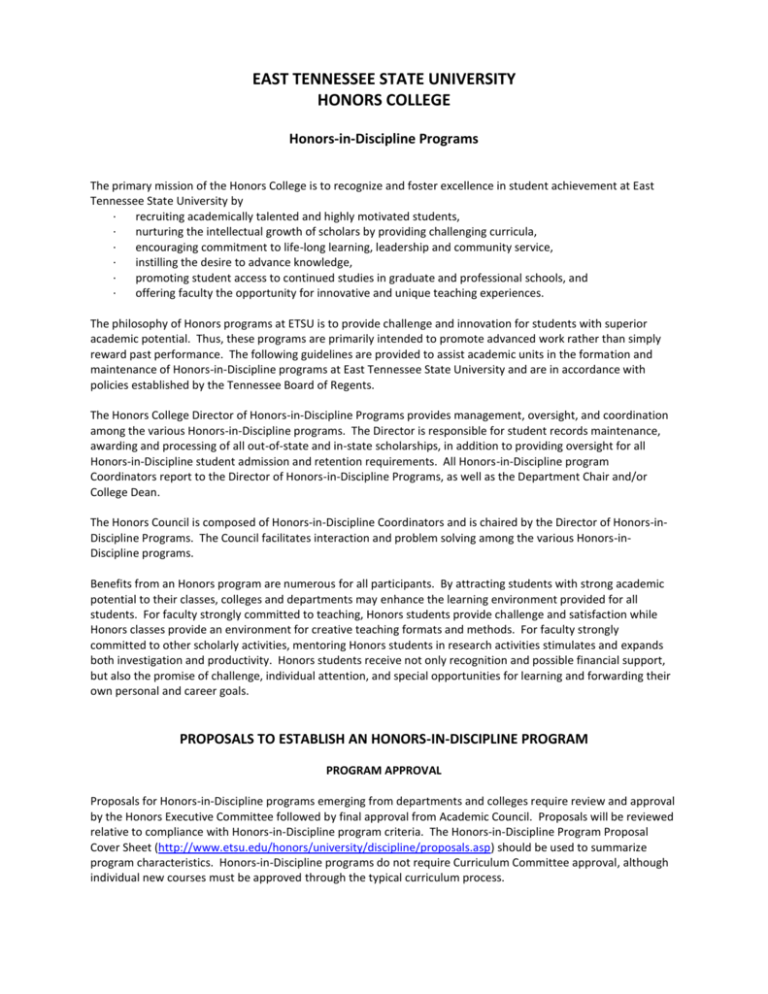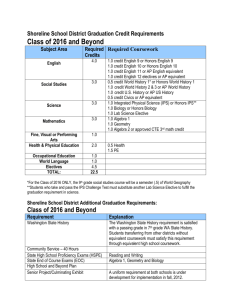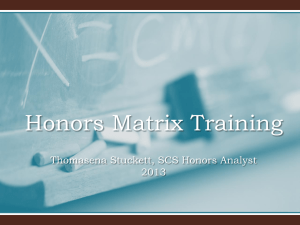HID Proposal Guidelines - East Tennessee State University
advertisement

EAST TENNESSEE STATE UNIVERSITY HONORS COLLEGE Honors-in-Discipline Programs The primary mission of the Honors College is to recognize and foster excellence in student achievement at East Tennessee State University by · recruiting academically talented and highly motivated students, · nurturing the intellectual growth of scholars by providing challenging curricula, · encouraging commitment to life-long learning, leadership and community service, · instilling the desire to advance knowledge, · promoting student access to continued studies in graduate and professional schools, and · offering faculty the opportunity for innovative and unique teaching experiences. The philosophy of Honors programs at ETSU is to provide challenge and innovation for students with superior academic potential. Thus, these programs are primarily intended to promote advanced work rather than simply reward past performance. The following guidelines are provided to assist academic units in the formation and maintenance of Honors-in-Discipline programs at East Tennessee State University and are in accordance with policies established by the Tennessee Board of Regents. The Honors College Director of Honors-in-Discipline Programs provides management, oversight, and coordination among the various Honors-in-Discipline programs. The Director is responsible for student records maintenance, awarding and processing of all out-of-state and in-state scholarships, in addition to providing oversight for all Honors-in-Discipline student admission and retention requirements. All Honors-in-Discipline program Coordinators report to the Director of Honors-in-Discipline Programs, as well as the Department Chair and/or College Dean. The Honors Council is composed of Honors-in-Discipline Coordinators and is chaired by the Director of Honors-inDiscipline Programs. The Council facilitates interaction and problem solving among the various Honors-inDiscipline programs. Benefits from an Honors program are numerous for all participants. By attracting students with strong academic potential to their classes, colleges and departments may enhance the learning environment provided for all students. For faculty strongly committed to teaching, Honors students provide challenge and satisfaction while Honors classes provide an environment for creative teaching formats and methods. For faculty strongly committed to other scholarly activities, mentoring Honors students in research activities stimulates and expands both investigation and productivity. Honors students receive not only recognition and possible financial support, but also the promise of challenge, individual attention, and special opportunities for learning and forwarding their own personal and career goals. PROPOSALS TO ESTABLISH AN HONORS-IN-DISCIPLINE PROGRAM PROGRAM APPROVAL Proposals for Honors-in-Discipline programs emerging from departments and colleges require review and approval by the Honors Executive Committee followed by final approval from Academic Council. Proposals will be reviewed relative to compliance with Honors-in-Discipline program criteria. The Honors-in-Discipline Program Proposal Cover Sheet (http://www.etsu.edu/honors/university/discipline/proposals.asp) should be used to summarize program characteristics. Honors-in-Discipline programs do not require Curriculum Committee approval, although individual new courses must be approved through the typical curriculum process. COMPONENTS OF THE PROPOSAL All Department/College proposals should include consideration of the following: I. II. III. IV. V. Academic program of study Student admission, retention and graduation requirements Program coordination and student advisement Recruitment and program enrichment activities Additional resources needed I. Academic Program of Study: A. Number of credit hours required Honors-in-Discipline programs must offer at least 12 hours of course work plus a capstone course of 6 credit hours or 15 hours of course work plus a capstone of 3 hours. Thus, a minimum of 18 credit hours of Honors courses must be available to participants. This minimum meets standards set by the National Collegiate Honors Council. B. Types of courses An Honors-in-Discipline program proposal should indicate which courses are included in the program along with their type (as described below). Honors sections of existing courses should indicate potential differences from existing courses. Honors-enriched courses should provide a brief description of the enrichment options that will be available to Honors students. Honors sections or Honors-enriched courses do not need separate curriculum review/approval. New courses designed exclusively for Honors should include the proposed course number, title, and catalog description. These courses may be offered initially on an experimental basis, but must be submitted for review and approval according to standard College and University review procedures. Any new courses should be incorporated in prerequisite lists for higher level courses, especially if the Honors courses replace other required major courses. 1. Honors sections of existing courses These are existing courses with a special section in which only Honors students or prospective Honors students (with the Honors-in-Discipline coordinator’s permission) may register. They often represent smaller, more intense sections of lower division courses. These sections should have a reduced maximum enrollment, usually less than 25. The Honors section should cover the same material as other sections, but carry a significantly higher expectation of student understanding and learning. Ordinarily, exams and evaluations should be more difficult than those in other sections. New Honorsin-Discipline programs may not be large enough to offer such sections. An example in the current curriculum is Honors Calculus. Such course sections are designated -088 for Fall & Spring semesters (008 for Summer, -SA8 for ETSU Study Abroad). The Registrar will place “Honors” on the transcript course title for students enrolled in these sections. Honors students enroll in section -088/-008/-SA8 by permit (i.e., closed section with enrollment = 0, which students add by permit only). 2. Honors-enriched courses These are existing courses, typically upper division level, in which Honors students are registered along with other students. Honors students complete appropriate enrichment experiences in addition to or in replacement of regular course requirements. The enrichment experience may vary from an independent laboratory project to analysis of a current research paper or one-on-one discussion sections with faculty. Sample experience(s) to be used must be included in course descriptions provided in the proposal for Honors-in-Discipline program approval. In general, the demand on the Honors student should be the same as on the non-Honors students in the same class, with the exception of the honors enrichment experience. In order to track Honors students in these courses, an additional section numbered -088 (-008 for Summer; -SA8 for ETSU Study Abroad) to be offered at the same time as regular sections should be scheduled. Honors students should enroll in sections -088/-008/-SA8 by permit. 2 3. Honors Designated Courses These are courses that, because of content or mode of delivery, are replacements for existing core, major, or minor requirements or are designed as additional courses for an Honors program students only. Enrollment is limited to honors scholars, but may include students from any honors program. Typically, the Honors course format may be distinct from traditional courses, but always should emphasize active learning and scholarly activities. These include such formats as seminars, journal clubs, supervised teaching opportunities, service-learning components, or interdisciplinary instruction. Examples of such courses include Honors Orientation, Honors Research Orientation, and Honors Seminar. Enrollment in these courses usually is restricted to students coded as Honors. These courses must be numbered with last digit ‘8’ (e.g., HIST xxx8), and the title must include “Honors.” Coordinators should enroll Honors students in these courses by permit. 4. Capstone course---Senior Honors thesis Honors-in-Discipline programs require completion of an Honors thesis as their capstone course (with course number 4018). Other options for capstone experiences may be approved; complete details should be included in the proposal for review by HAC. A faculty member in the discipline directs the Honors thesis, and two faculty members (one from within the department and one from outside the department) should be appointed to an advisory committee who act as readers of the thesis and attend the oral presentation. The thesis project should be at least a year-long endeavor begun no later than the first semester of the senior year and completed during the second semester. In some disciplines, students are encouraged to begin earlier than the senior year, so thesis enrollment for juniors is acceptable. Students may be granted up to 6 hours credit for senior thesis (i.e., 3 credits, Fall and Spring). In order to graduate with Honors-in Discipline designation, a student must make a grade of B or higher on the honors thesis. The thesis must be presented publicly, with the thesis mentor present. All students must submit their thesis to the eThesis repository (http://honors.epub.etsu.edu/); full access may be embargoed for up to 2 years. In addition, one bound (spiral) copy of the thesis with original signed cover page must be submitted to the Honors College for archival purposes. Students are encouraged to make copies available to their professor, and department or college. Guidelines for Honors students and Honors thesis professors are available online (link). University Honors Scholars, Midway Scholars, or Arts Scholars who participate in an Honors-in-Discipline program are required to do only one 6-hour thesis to fulfill expectations of both programs. However, students participating in two Honors-in-Discipline programs simultaneously are expected to plan for an interdisciplinary thesis project, with co-directors from each program and thesis enrollment divided (3 credits in one program followed by 3 credits next semester in the 2 nd program. Exceptions may be granted, but require approval of the HID Coordinators in both programs and Director of HID programs. C. Course and Section Numbering 1. The senior Honors thesis courses are similar to independent studies or graduate thesis courses. A campus-wide course number (xxxx 4018) and title, "Senior Honors Thesis” has been designated for these courses. For each department, the course number 4018 with the specific prefix of the discipline will be used (e.g., MATH 4018). Section numbers are determined in a manner similar to that used for Independent Studies (-001, -002, etc.)---each combination of faculty member and enrollment hours initiates a new section. Students may enroll for 3 hours each semester, for a maximum of 6 hours. 2. All courses designed exclusively for Honors students must have a course number that ends with the digit 8 and have “Honors” as the first word in the title. Because these courses are small and restricted in enrollment, one section (-001) should be sufficient. 3 3. Honors-enriched courses and Honors sections of existing courses will carry the same course number as the "non-enriched" sections of the same course, but should be assigned section number -088 during fall and spring semesters (section -008 for Summer or –SA8 for ETSU Study Abroad). This system allows tracking of students through their Honors curriculum. In addition, the Registrar’s Office will add the transcript designation of “Honors” to all courses with -088/-008/-SA8 section numbers. II. Student Admission, Retention & Graduation Requirements: The following are ETSU minimum requirements defining a “bona fide” honors program as per Tennessee Board of Regents provisions concerning Honors programs admission and retention criteria. Honors-inDiscipline programs may raise these minimum criteria. However, for students to be recognized as members of an ETSU Honors program, these standards may not be lowered. A. Entering freshmen: Freshmen admitted to Honors-in-Discipline programs must have a minimum high school GPA of 3.2 overall on a 4.0 scale or a minimum ACT composite score of 25 (excluding writing) or SAT of 1130 (reading and math only; writing excluded). B. Students entering programs after their first semester freshman year at ETSU: Admission of this group of students into Honors programs will be based on their academic performance at ETSU. To be admitted into Honors-in-Discipline programs students must have a minimum overall GPA of 3.2 or a minimum GPA of 3.5 in department/college courses. C. Transfer students: Admission of this group of students into Honors programs will be based on their academic performance at their previous college, university or community college. To be admitted into Honors-in-Discipline programs students must have a minimum overall GPA of 3.2. Application & Admissions procedures: An application form should be developed for each Honors-in-Discipline Program. Application forms should be made available to students through departmental or college offices and online. They should include the information in the draft application form available from the Director of Honors-in-Discipline Programs. Disciplines may modify the application text, but changes in the ETSU Honors logo must be approved by both the Honors College and University Relations. As of September 2013, the ETSU logo is under review; we will update HID programs of any changes required. Each discipline is free to add criteria for admission to its program, but any additional criteria must be specified in the program proposal. Each program is responsible for processing applications and adhering to admission criteria specified. Honors Program Retention requirements: To remain in good standing in an Honors program, students must be making satisfactory progress towards completing all required Honors-in-Discipline classes. Requirements for GPA may vary, but incoming freshmen are typically held to the following minima: semester GPA of 2.75 for their first 30 attempted hours, 3.0 for 31--45 hours, 3.15 for 46--60 hours, and 3.25 for the remainder of their academic careers at ETSU. Note that these GPA requirements are evaluated on a semester basis. Honors College policies relating to probationary periods, failed courses, misconduct, etc. (http://www.etsu.edu/honors/Policies.asp) must be followed by all HID programs. Again, departments or colleges may levy higher requirements, but not lesser. Any differences from College policies should be included in the program proposal. Typically, students who fail to meet program standards are allowed one probationary semester before they are suspended from an Honors program and out-of-state tuition waivers or Honors-in-Discipline scholarships are withdrawn. Coordinators must inform the Director as soon as any student is put on probation. Honors-in-Discipline Scholarship Award (in-state or out-of-state) and Retention requirements: In order to minimally qualify for an in-state or out-of-state Honors-in-Discipline scholarship, an incoming freshman ETSU student must have an ACT score of 25 or higher and a high school GPA of 3.5 or higher. A student receiving an Honors-in-Discipline scholarship must enroll in at least 15 credit hours per semester. An exception is the capstone semester when scholarship recipients may register for only 12 hours. All 4 scholarship recipients must maintain a cumulative grade point average consistent with program standards. Typically, students who fail to meet program standards are allowed one probationary semester before their in-state or out-of-state scholarships are revoked. Questions regarding retention of Honors-in-Discipline scholarships should be directed to the Director of Honors-in-Discipline Programs. Graduation requirements: To graduate with Honors-in-Discipline designation at ETSU, students must have a minimum 3.25 GPA, complete all required courses (Honors, General Education, Academic Proficiencies), and complete and orally present the senior Honors thesis. In addition, all thesis grades (or capstone experience grades if other than thesis) must be B or higher. III. Program Coordination and Student Advisement: A faculty member in the department must be designated as the Honors Coordinator. Some programs may wish to establish a departmental Honors Committee to assist the Coordinator. Departments are asked to provide workload credit (at least one course reassignment per year) to faculty involved with Honors in their departments. The Coordinator (with possible assistance from a committee) will be primarily responsible for evaluating applications, advising all Honors students, providing the departmental chair with Honors class schedule information, managing recruitment efforts, providing necessary reports to the Director of Honorsin-Discipline Programs, and serving on the Honors Council. The Honors-in-Discipline proposal should include a description of how these activities will be administered in the department, the name of the coordinator if it is known at the time of proposal, and the workload credit that will be provided to the coordinator. IV. Recruitment and Program Enrichment Activities: Recruitment: Each proposal should include a plan for how the program will recruit students, both existing students and incoming freshmen. Items may include brochures, use of Banner to obtain listing of qualified students, direct mailings, and notices within the department. The Director of HID programs will forward applications of incoming freshmen who apply, but are not selected, as University Honors Scholars (ACT 29+). These students are exceptional candidates for program that accept freshmen. We ask that HID Coordinators accept the existing application and request the candidate to provide only any additional materials (e.g., essay) required. Enrichment Activities: It is recommended that departments/colleges consider suggested activities (such as involvement in student organizations, honors societies, seminars) to augment the experiences of their Honors students. Honors students should be encouraged to present their research at the ETSU Boland Undergraduate Research Symposium, Appalachian Student Research Forum, or other undergraduate venues. Proposals may also include special activities, such as social gatherings, that will encourage Honors students to interact with one another and with faculty. V. Additional Resources Needed: The Honors College provides access to student facilities in Yoakley Hall----a project/study room and computer lab are available. Typically sophomores, juniors and seniors are given building and room access (electronic via their ID card) on a 24/7 basis. These facilities are intended to help HID programs provide special benefits to their students. However, every proposal should address potential needs and include a list of any additional resources needed to initiate an Honors-in-Discipline program. Items may include faculty, space, and computer or library resources. If additional resources are needed, the proposal should include the sources from which funding will be sought. 5 MAINTENANCE OF HONORS-IN-DISCIPLINE PROGRAMS The Director of Honors-in-Discipline Programs is available to address any questions or assist programs with resolving any problems that may arise. Coordinators are asked to contact the Director before seeking other avenues of information. The Director is a resource available to coordinators, department chairs and deans, and is responsible for oversight of all admissions and retentions to insure adherence to approved criteria and policies. The Dean of the Honors College may be called upon to act as a mediator in disagreements with students pertaining to Honors programs. I. Admissions & Admissions Reporting: Honors-in-Discipline Coordinators are responsible for processing applications and admitting applicants into their Honors-in-Discipline programs. As students are accepted into Honors-in-Discipline programs, coordinators should submit to the Director of Honors-in-Discipline Programs a copy of the acceptance letter along with Banner E number, resident status, and preferred email address. Upon receipt of the information, the Director will code the Honors students on the Banner system with a code unique to each program. Only the offices within the Honors College may code Honors students, so coordinators should not request this coding from any other office (including the Registrar). This special code is used by the Honors College to assist programs in tracking student progress toward graduation. II. Student Financial Support: Honors scholarships are independent of other scholarships at ETSU, including Academic Performance scholarships (APS). However, ETSU students may not hold two tuition scholarships simultaneously (i.e., HID and APS). Currently enrolled students are not eligible for APS; thus, loss of an Honors-in-Discipline scholarship cannot re “replaced” by APS. Students may retain both an Honors tuition scholarship and a Hope (“lottery”) scholarship simultaneously. ETSU students may receive tuition scholarships for a total of 8 fall/spring semesters, including a combination of APS and HID (e.g., a junior is awarded an honors scholarship for a maximum of 4 semesters, after receiving 4 semesters of APS). Students who leave one HID program for another are not guaranteed scholarship award in that second program. No student may accumulate scholarship benefits that exceed full educational costs (including tuition, fees, room and board), as determined by the Office of Financial Aid. Honors scholarship recipients have no work requirement (APS requires 75 hrs/semester). It is intended that students awarded Honors-in-Discipline scholarships (in-state or out-of-state) will retain that scholarship if they continue to make satisfactory progress in their honors program and until they reach a maximum of 8 fall/spring semesters (if no other tuition scholarship has been used). Only out-of-state honors scholarships may be continued for summer term enrollments. A. Honors-in-Discipline In-State Scholarships There are a limited number of Honors-in-Discipline scholarships covering full tuition and most fees at ETSU. In order to qualify for an Honors-in-Discipline scholarship, an incoming freshman ETSU student must have a minimum ACT score of 25 or higher and a high school GPA of 3.5 or higher. Each semester the Director of Honors-in-Discipline Programs will tell coordinators of the various Honorsin-Discipline Programs the number of new in-state scholarships available for the following semester. The Honors-in-Discipline coordinators are then responsible for providing the Director with a prioritized list of the students recommended for in-state scholarships. Honors-in-Discipline coordinators should make their award recommendations to the Honors College by May 15 for the fall semester and by January 1 for the spring semester. The Director of Honors-in-Discipline Programs will send all award letters to the students. The Honors College will process all scholarships directly with the Office of Financial Aid. 6 B. Honors-in-Discipline Out-of-State scholarships Out-of-state scholarships are provided for all qualified out-of-state students admitted into approved Honors programs, except as noted in section II. In order to ensure proper billing of tuition reductions for out-of-state Honors students, coordinators should send lists of those who qualify to the Honors Programs Office by July 1 for the fall semester and by January 1 for the spring semester. The Honors College will process all scholarships directly with the Office of Financial Aid. III. Retention & Annual Report The Honors College has developed policies on Satisfactory Progress that apply to all honors scholars at ETSU (http://www.etsu.edu/honors/Policies.asp). In addition, the Honors College Student Council has developed an Honors Code of Conduct (http://www.etsu.edu/honors/HCSC/Conduct.asp) that also applies to all honors scholars. Honors-in-Discipline Program Coordinators should monitor continued student eligibility for Honors program participation and notify the Director of Honors-in-Discipline Programs when a student is placed on probation or dismissed from a program. In the case of dismissal, the Director will remove Honors coding for that student and notify the Office of Financial Aid of the withdrawal of any scholarship funding. The Director will make periodic checks to insure compliance. A semester report from each Honors-in-Discipline program should be submitted to the Director of Honors-inDiscipline programs. This report should include data on all Honors-in-Discipline students currently associated with the program. Student data should provide (1) Name, (2) E number, (3) quality hours completed, (4) grade point average, and (5) notation of any probationary status. Coordinators should provide dates and cause (e.g., "did not meet minimum GPA") for any students that have been dismissed from their programs. IV. Procedures for Graduating Seniors: The following steps should be taken by the Honors-in-Discipline Coordinator when an Honors-in-Discipline student is ready to graduate to assure program requirement completion and proper recognition of Honors participation. A. Coordinators should check Banner to ensure that the curriculum requirements have been completed. This includes any required honors courses, completion of the minimum number of honors course hours required by the program, and completion of capstone course (typically Honors Thesis). B. All honors thesis must be submitted to the electronic Honors Thesis repository at ETSU (eThesis; http://honors.epub.etsu.edu/). In addition, the faculty mentor and student must complete and sign the XX form, indicating full access or a desired period of embargo. A copy of the signed thesis cover page and the XX form must be turned in to the Honors College for final acceptance of the thesis. C. Owing to archival needs, a bound (spiral) copy of the thesis, complete with signed cover page, must also be submitted to the Director of Honors-in-Discipline programs at the Honors College. Students are encouraged to provide other copies for their Honors program and/or mentor, but this is not a requirement (since the thesis will be available from eThesis). D. Coordinators should send the Director a list of Honors-in-Discipline program completion indicating student name, E#, and graduation semester. The Director will, upon receipt arrange for transcript recognition for the student showing completion of “Honors in name of major”. E. Coordinators should arrange for appropriate college or departmental recognition of graduating students who have completed the program. The Honors College will invite these students to receive special recognition (engraved medallions provided) at the annual spring Academic Excellence Convocation, and students and their mentors will be invited to attend a special pinning ceremony. 7 V. Course Scheduling: Honors Designated courses: Scheduling of courses exclusive to Honors students follows standard procedures. Honors Sections of existing courses: When an Honors section of an existing course is to be offered, the department will need to create a special section numbered -088 (Fall & Spring semesters; -008 summer terms; -SA8 summer study abroad). In addition, the Registrar must be provided with a note reading as follows (replace italicized course number appropriately): "HONR 1100–088 TITLE is an Honors section; enrollment by permit only." This note will be published in the class schedule. The Registrar will annotate the course title for that section only with "Honors" on each student’s transcript. Honors-enriched courses: Through advisement with Honors students and pertinent faculty, the Honors-in-Discipline Coordinator should determine the number of students that will need these enriched Honors courses each semester. In general, the scheduling procedures are similar to those used for Honors sections of existing courses---a special section (-088 Fall & Spring semesters; -008 summer terms; -SA8 for ETSU summer study abroad) will be designated for students who enroll under the Honors-enriched status. These sections must be scheduled at the same time as other sections, allowing students to participate fully in regular course work in addition to completing their enrichment projects. The Registrar will annotate the course title for that section only with "Honors" on each student’s transcript. Procedures are in place to handle unusual scheduling problems, such as an honors section of an evening class. When in doubt, coordinators should contact the Director of Honors-in-Discipline Programs. VI. Recruitment Efforts: Each Honors-in-Discipline program is responsible for its own recruitment efforts. The Director of Honorsin-Discipline Programs will assist whenever possible. The Director will keep the Scholarship Office and the Office of Admissions updated with the names of Honors coordinators and criteria for admission to the Honors-in-Discipline Programs. The Honors Council will provide a forum for the exchange of ideas about recruitment and for coordination of recruitment efforts among Honors-in-Discipline programs. VII. Honors-in-Discipline Council: The Coordinator of each Honors-in-Discipline Program serves on the Honors Council. The Council is a working group called together to facilitate communication and interaction among the various discipline programs and the Honors College. This is not a policy-making body although questions or needs that arise in the Council will be forwarded to the Honors Faculty Committee for resolution. Coordinators will serve on the Council for the entire tenure of their service as Coordinators of their programs. VIII. Amending an existing Honors-In-Discipline Program: Program changes may include adding new Honors or Honors-enriched courses, altering admission or retention criteria, etc. Requests for changes should be made no later than January 1 of each academic year so that they may be incorporated in the program description included in the Undergraduate Catalog for the following year (deadline February 1). Proposed changes to existing Honors-in-Discipline programs should be communicated to the Director of Honors-in-Discipline Programs by memorandum. This memorandum should include an explanation of the proposed change and should be signed by the Honorsin-Discipline Program Coordinator and either the chair (departmental program) or the dean (college program). The proposed amendment will then be acted on or sent to the Honors Executive Committee for consideration, at the discretion of the Director. September 2013 8








